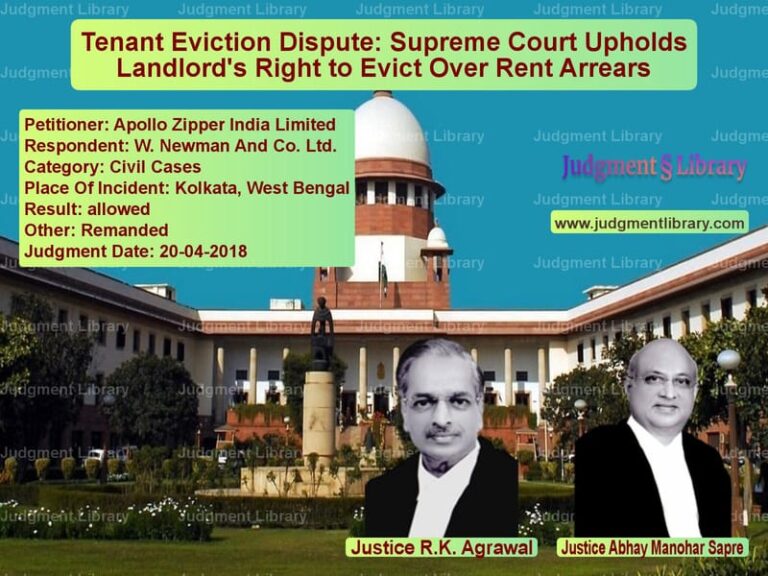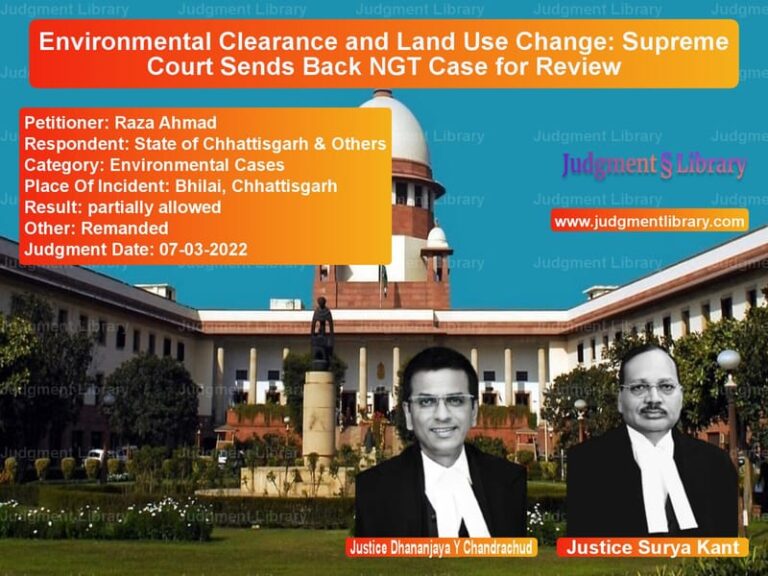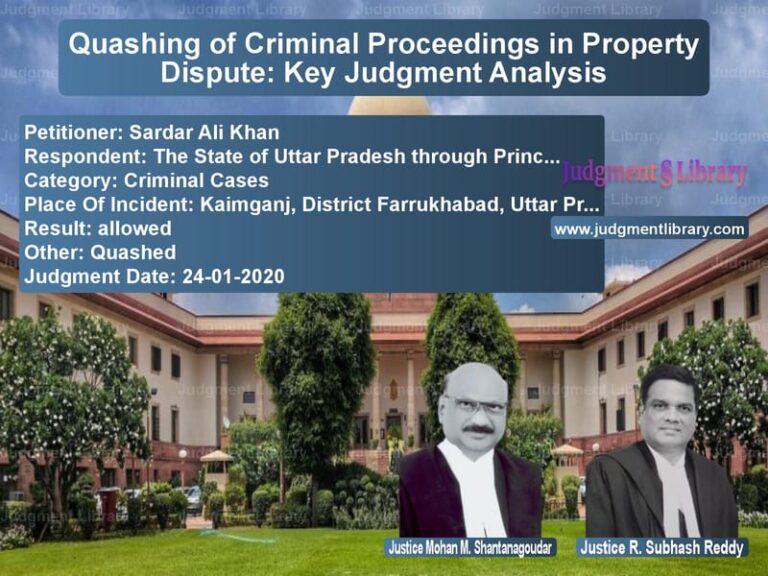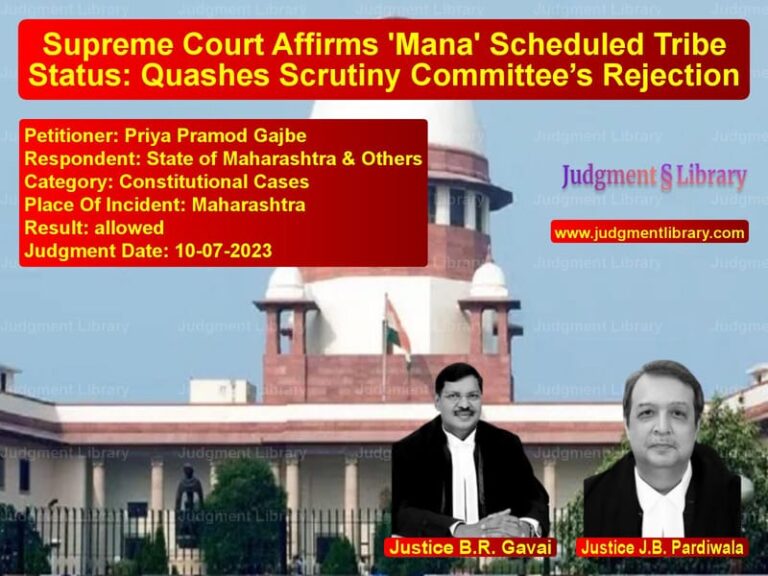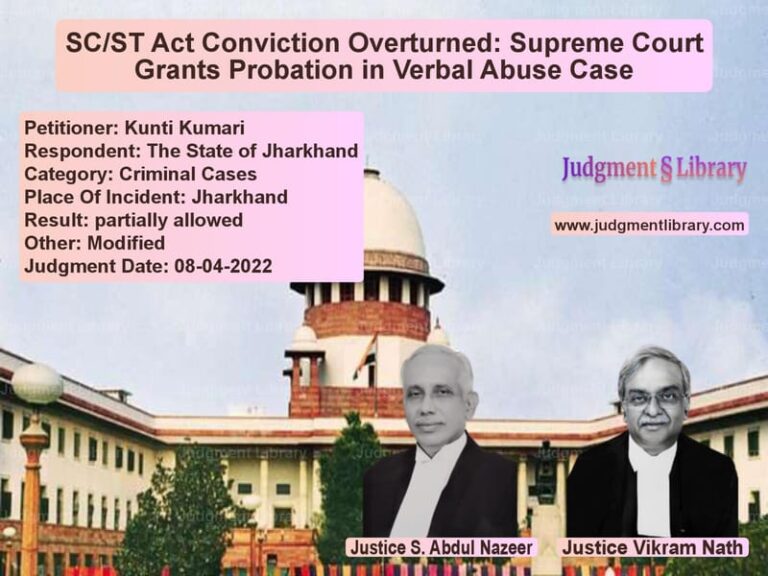Supreme Court Overturns Pre-emption Decree: Key Judgment on Co-owners’ Rights
The Supreme Court of India recently delivered a significant judgment in the case of Ram Kishan & Another vs. Daya Nand (D) Thr. LRS & Others, addressing the right of pre-emption in property disputes involving co-owners. The ruling clarifies when co-owners lose their pre-emption rights after partition proceedings under the Punjab Land Revenue Act, 1887. The judgment overturns a previous ruling by the Punjab and Haryana High Court, which had upheld the pre-emption claim of the respondents.
Background of the Case
The dispute arose from the sale of agricultural land among co-owners. The key events leading up to the legal battle were as follows:
- Respondent No. 5, Rajinder, sold portions of his share in the property to different buyers.
- Sale Deed in favor of appellant Ram Kishan and Jit Singh was executed on October 26, 1988.
- Sale Deed in favor of appellants Siri Bhagwan, Sunil, and Anil was executed on November 29, 1988.
- On January 16, 1989, the authorities passed an order under Section 118 of the Punjab Land Revenue Act, initiating the partition of the property.
- The trial court, on October 31, 1990, dismissed the pre-emption suit filed by the respondents.
- The first appellate court reversed this decision on October 3, 1991, granting the pre-emption decree.
- The Punjab and Haryana High Court, on August 31, 2018, upheld the pre-emption claim.
The case then reached the Supreme Court, where the appellants sought to overturn the pre-emption decree.
Petitioner’s (Appellants’) Arguments
- The appellants argued that the respondents lost their right to pre-emption once the partition process under Section 118 of the Punjab Land Revenue Act was initiated.
- The joint ownership of the property ceased with the passing of the partition order on January 16, 1989, before the appellate court had decreed pre-emption.
- They relied on the Supreme Court’s previous ruling in Jhabbar Singh (Deceased) Through Legal Heirs and Others v. Jagtar Singh (2023 SCC OnLine SC 431), which established that pre-emption rights exist only until final partition.
- The High Court erred in holding that the pre-emption right continued until the final execution of the partition instrument under Section 121 of the Punjab Land Revenue Act.
Respondent’s (Plaintiffs’) Arguments
- The respondents argued that as co-owners, they had an inherent right to pre-empt the sale of shares by another co-owner.
- The partition process had not been completed as the Naksha Zeem (final partition map) was prepared only on March 27, 1992, after the pre-emption suit was decreed.
- The judgment of the first appellate court was based on long-standing legal principles that a co-owner retains pre-emption rights until final partition.
- The execution of the partition deed was merely a formal administrative process, and substantive ownership remained joint until its completion.
Key Observations by the Supreme Court
The Supreme Court, in reversing the High Court’s decision, made the following key observations:
1. Pre-emption Rights Cease with Partition Order:
The Court ruled that the pre-emption right of a co-owner ceases when an order for partition is passed under Section 118 of the Punjab Land Revenue Act. The ruling clarified:
“Joint status ceases when an order for division of the property under Section 118 of the Revenue Act is passed. The preliminary decree of partition decides the share and entitlement to division and separate possession.”
2. Application of Precedents:
The Court referred to its decision in Shyam Sunder v. Ram Kumar (2001) 8 SCC 24, which held that pre-emptors must possess the right to pre-empt on both the date of sale and the date of the decree.
3. Final Execution vs. Partition Order:
The Court rejected the High Court’s view that pre-emption rights continued until the final execution of the partition deed. It clarified:
“The date on which an order under Section 118 of the Revenue Act is passed or Naksha Bey is directed, is the date of partition. The rights and status of the parties stand decided.”
Final Judgment
The Supreme Court set aside the High Court’s order, ruling in favor of the appellants:
- The pre-emption suits filed by the respondents were dismissed.
- Any deposit made by the respondents in lieu of the pre-emption decree was ordered to be refunded with accrued interest.
- The judgment established that the partition order under Section 118 terminates the pre-emption rights of co-owners.
Implications of the Judgment
This ruling has significant implications for co-owner disputes:
- Finality of Partition Orders: Once a partition order is passed under revenue laws, co-owners can no longer claim pre-emption rights.
- Clarification on Co-ownership Rights: The judgment draws a clear line between substantive partition (under Section 118) and administrative execution (under Section 121).
- Protection of Purchasers’ Rights: Buyers of co-owners’ shares will now have greater protection against pre-emption claims if partition orders have been passed.
Conclusion
The Supreme Court’s decision in Ram Kishan & Another vs. Daya Nand & Others is a landmark ruling clarifying that pre-emption rights cease once a partition order is passed under Section 118 of the Punjab Land Revenue Act. The ruling reinforces that administrative execution under Section 121 does not extend pre-emption claims, ensuring finality in property transactions and protecting the rights of bona fide purchasers.
Petitioner Name: Ram Kishan & Another.Respondent Name: Daya Nand (D) Thr. LRS & Others.Judgment By: Justice Sanjiv Khanna, Justice S.V.N. Bhatti.Place Of Incident: Punjab and Haryana.Judgment Date: 10-10-2023.
Don’t miss out on the full details! Download the complete judgment in PDF format below and gain valuable insights instantly!
Download Judgment: ram-kishan-&-another-vs-daya-nand-(d)-thr.-l-supreme-court-of-india-judgment-dated-10-10-2023.pdf
Directly Download Judgment: Directly download this Judgment
See all petitions in Property Disputes
See all petitions in Landlord-Tenant Disputes
See all petitions in Succession and Wills
See all petitions in Judgment by Sanjiv Khanna
See all petitions in Judgment by S.V.N. Bhatti
See all petitions in allowed
See all petitions in Quashed
See all petitions in supreme court of India judgments October 2023
See all petitions in 2023 judgments
See all posts in Civil Cases Category
See all allowed petitions in Civil Cases Category
See all Dismissed petitions in Civil Cases Category
See all partially allowed petitions in Civil Cases Category



